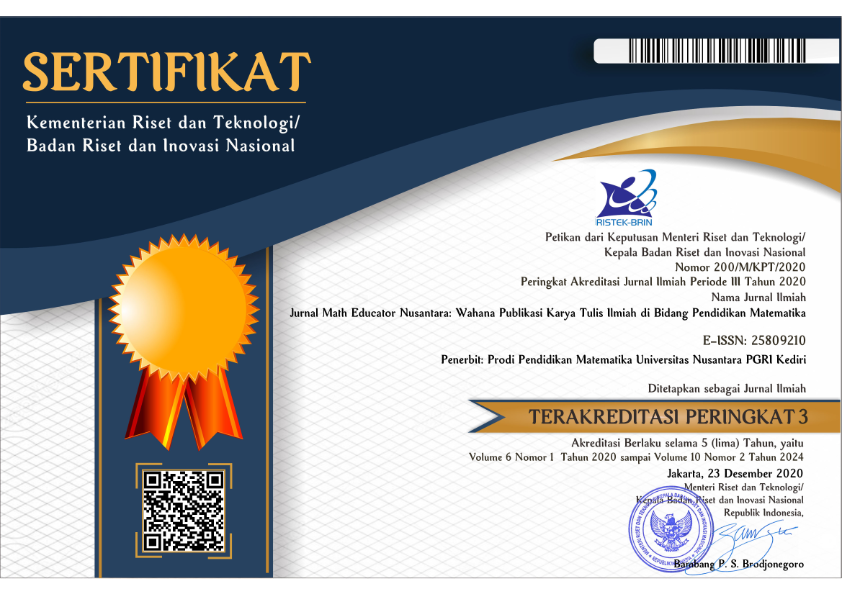Ethnomathematics in the traditional game lompek kodok bengkulu
DOI:
https://doi.org/10.29407/jmen.v10i1.22264Keywords:
culture, ethnomathematics;, traditional game, lompek kodokAbstract
Ethnomathematics combines elements of mathematics with the culture and traditions of society. Culture is a complete and comprehensive unity that applies to society, while mathematics is a science that society uses to solve everyday problems. The aim of this research is to find mathematical patterns contained in the traditional game Lompek Kodok and to find out how players use mathematics naturally in the game strategy. Data collected through qualitative research methods, and interviews with elders and trusted people, direct game observation, and analysis of game rules. The first stage of research involves determining the topic and discussion that will be researched, then determining the area that will be used as the search location. After that, design and organize the time needed to complete data collection using interviews and observations. Then record the results of the interview and document them. The next step is data analysis by processing the data obtained and describing the ethnomathematics in the traditional Bengkulu lompek kodok game. It is hoped that the results of this research will provide new insights into how mathematical concepts can be used in local culture through ethnomathematics.
References
Anggita, G., Rachman, H., Yun-Chen, C., Sugiarto, S., Ali, M., Chaerudin, C., Candra, A., & Milla, F. (2020, October 28). The Differences of Elementary School Students’ Interest on Traditional Games and Online Games. https://doi.org/10.4108/eai.22-7-2020.2300277
Chrissanti, M. I. (2019). Etnomatematika sebagai salah satu upaya penguatan kearifan lokal dalam pembelajaran matematika. Math Didactic: Jurnal Pendidikan Matematika, 4(2018), 243–252. https://doi.org/10.33654/math.v4i0.191
Eurasia, J., Matematika, P., Teknologi, S., Umbara, U., Wahyudin, W., & Prabawanto, S. (2021). Machine Translated by Google Mengeksplorasi Etnomatematika dengan Pendekatan Metodologi Etnomodeling : Bagaimana Masyarakat Adat Cigugur Menggunakan Perhitungan untuk Menentukan Hari Baik Membangun Rumah Machine Translated by Google. 17(2).
Fadjar, T., Achmaddin, M., & Rani, M. Z. (1984). Permainan Rakyat Daerah Bengkulu. Departemen Pendidikan Dan Kebudayaan, 53(9), 1689–1699.
Fauzi, A., & Lu’luilmaknun, U. (2019). Etnomatematika Pada Permainan Dengklaq Sebagai Media Pembelajaran Matematika. AKSIOMA: Jurnal Program Studi Pendidikan Matematika, 8(3), 408. https://doi.org/10.24127/ajpm.v8i3.2303
Harahap, N. S., & Jaelani, A. (2022). Etnomatematika pada Permainan Tradisional Engklek. Paradikma: Jurnal Pendidikan …, 86–90. https://jurnal.unimed.ac.id/2012/index.php/paradikma/article/view/35995%0Ahttps://jurnal.unimed.ac.id/2012/index.php/paradikma/article/viewFile/35995/18838
Hasan, M. A., & Budiarto, M. T. (2022). EKSPLORASI ETNOMATEMATIKA BUDAYA MASYARAKAT SIDOARJO. Jurnal Ilmiah Pendidikan Matematika, 11(2).
Irawan, A. (2018). Penggunaan Ethnomatematika Engklek Dalam Pembelajaran Matematika. Jurnal MathEducation Nusantara, 1(1), 46–51. https://jurnal.pascaumnaw.ac.id/index.php/
Jenahut, K. S., & Maure, O. P. (2020). Eksplorasi Etnomatematika pada Permainan Banga Masyarakat Manggarai Timur. Jurnal Inspiratif Pendidikan, 9(1), 138–151.
Kurniawan, W., & Hidayati, T. (2019). Etnomatematika: Konsep dan Eksistensinya. Penerbit CV. Pena Persada.
Mahuda, I. (2020). Eksplorasi Etnomatematika Pada Motif Batik Lebak Dilihat Dari Sisi Nilai Filosofi Dan Konsep Matematis. Lebesgue, 1(1), 29–38. https://doi.org/10.46306/lb.v1i1.10
Manapa, I. Y. H. (2021). Etnomatematika: Kekayaan Budaya Kabupaten Alor Sebagai Sumber Media Pembelajaran Matematika Di Sekolah Dasar. Numeracy, 8(1), 1–24. https://doi.org/10.46244/numeracy.v8i1.1396
Mania, S., & Alam, S. (2021). Teachers’ perception toward the use of ethnomathematics approach in teaching math. International Journal of Education in Mathematics, Science and Technology, 9(2), 282–298. https://doi.org/10.46328/IJEMST.1551
Manihuruk, F., Sumaryanto, S., Nugroho, S., Nasrulloh, A., Sumarjo, S., & Sumaryanti, S. (2023). Exploration of The Traditional Game of Galah Hadang: Does it Effect The Concentration, Agility and Endurance of Early Age Badminton Players? JOSSAE (Journal of Sport Science and Education), 8(1), 11–20. https://doi.org/10.26740/jossae.v8n1.p11-20
Marina, M., & Izzati, N. (2019). Eksplorasi Etnomatematika pada Corak Alat Musik Kesenian Marawis sebagai Sumber Belajar Matematika. Jurnal Gantang, 4(1), 39–48. https://doi.org/10.31629/jg.v4i1.1027
Masamah, U. (2019). Pengembangan Pembelajaran Matematika Dengan Pendekatan Etnomatematika Berbasis Budaya Lokal Kudus. Jurnal Pendidikan Matematika (Kudus), 1(2).
Pathuddin, H., Kamariah, & Ichsan Nawawi, M. (2021). Buginese ethnomathematics: Barongko cake explorations as mathematics learning resources. Journal on Mathematics Education, 12(2), 295–312. https://doi.org/10.22342/jme.12.2.12695.295-312
Patri, S. F. D., & Heswari, S. (2021, March). Development of ethnomathematic-based on mathematics e-module to improve students’ logical thinking skills. In AIP Conference Proceedings (Vol. 2330, No. 1). AIP Publishing.
Putri, L. (2017). Eksplorasi Etnomatematika Kesenian Rebana Sebagai Sumber Belajar Matematika Pada Jenjang Mi. Jurnal Ilmiah Pendidikan Dasar UNISSULA, 4(1), 136837.
Riski, Y., Tito, V., & Krister, P. (2020). Kajian Etnomatematika Anyaman Bambu Yogyakarta Di Desa Wisata Kerajinan Bambu Brajan Dan Implementasinya Pada Pembelajaran Topik Geometri. Seminar Nasional Pendidikan Matematika, 143–152. https://conference.unikal.ac.id/index.php/sandika/sandika1/paper/view/334
Riswati, S., Netriwati, & Suherman. (2021). Identifikasi Etnomatematika pada Alam Gemisegh sebagai Kekayaan Matematika dan Budaya Lampung. Jurnal Pendidikan Matematika Raflesia, 06(2), 61. https://ejournal.unib.ac.id/index.php/jpmr/article/view/15607
Simbolon, S., Sapri, S., & Sapri, S. (2022). Analisis Kesulitan Belajar Siswa Kelas IV Materi Bangun Datar di Sekolah Dasar. Edukatif : Jurnal Ilmu Pendidikan, 4(2), 2510–2515. https://doi.org/10.31004/edukatif.v4i2.2081
Sutarto, S., Ahyansyah, A., Mawaddah, S., & Hastuti, I. D. (2021). Etnomatematika: Eksplorasi Kebudayaan Mbojo Sebagai Sumber Belajar Matematika. JP2M (Jurnal Pendidikan Dan Pembelajaran Matematika), 7(1), 33–42. https://doi.org/10.29100/jp2m.v7i1.2097
Syahwani, U. (2015). STRATEGI COOPERATIVE LEARNING MODEL JIGSAW DALAM PEMBELAJARAN IPS DI KELAS IX MTs NEGERI KETAPANG. Jurnal Pendidikan Dan Pembelajaran. http://jurnal.untan.ac.id/index.php/jpdpb/article/view/11346
Tambunan, H.-, & Simanjuntak, J. (2021). Etnomatematika: Eksplorasi Permainan Engklek Sebagai Media Pembelajaran Matematika (Etnomathematics: Exploration of Engklek Games As a Mathematics Learning Media). Jurnal Curere, 5(2), 1. https://doi.org/10.36764/jc.v5i2.664
Tri, W., Utami, P., & Trisnani, N. (2021). Alat Pembelajaran Berbasis Etnomatematika. 5, 593–600.
Uskono, D., Deda, Y. N., & Amsikan, S. (2023). Eksplorasi etnomatematika pada permainan tradisional kaneker di Desa Bitefa. Primatika : Jurnal Pendidikan Matematika, 12(1), 19–30. https://jurnal.fkip.unmul.ac.id/index.php/primatika/article/view/1312
Utami, R. E., Nugroho, A. A., Dwijayanti, I., & Sukarno, A. (2018). Pengembangan E-Modul Berbasis Etnomatematika Untuk Meningkatkan Kemampuan Pemecahan Masalah. JNPM (Jurnal Nasional Pendidikan Matematika), 2(2), 268. https://doi.org/10.33603/jnpm.v2i2.1458
Downloads
Published
Issue
Section
License
Authors who publish with this journal agree to the following terms:
- Copyright on any article is retained by the author(s).
- The author grants the journal, the right of first publication with the work simultaneously licensed under a Creative Commons Attribution License that allows others to share the work with an acknowledgment of the work’s authorship and initial publication in this journal.
- Authors are able to enter into separate, additional contractual arrangements for the non-exclusive distribution of the journal’s published version of the work (e.g., post it to an institutional repository or publish it in a book), with an acknowledgment of its initial publication in this journal.
- Authors are permitted and encouraged to post their work online (e.g., in institutional repositories or on their website) prior to and during the submission process, as it can lead to productive exchanges, as well as earlier and greater citation of published work.
- The article and any associated published material is distributed under the Creative Commons Attribution-ShareAlike 4.0 International License













